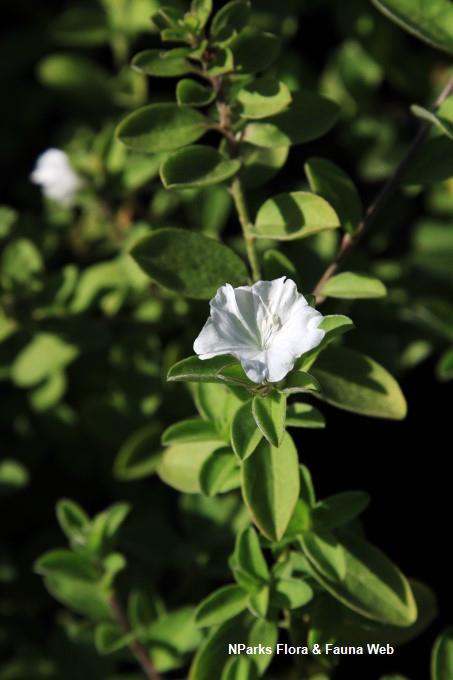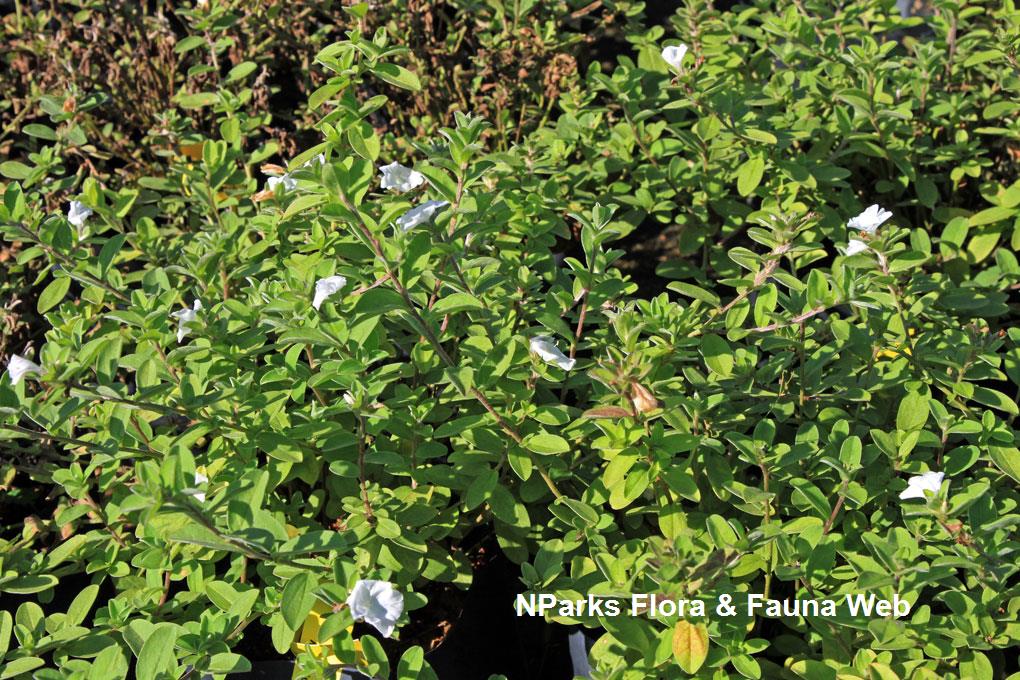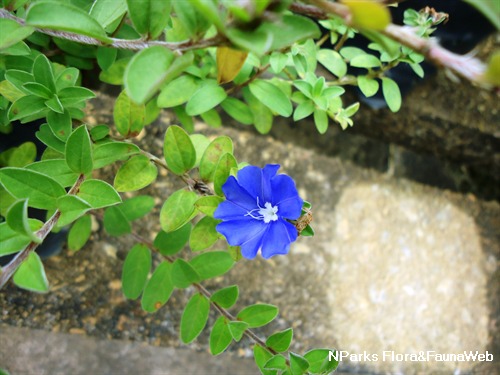---flower---koon-lee-nursery-(1)_vicky-lim.jpg)
Back
Evolvulus glomeratus 'Alba'
| Family Name: | Convolvulaceae |
Evolvulus glomeratus 'Alba' is a cultivar of Blue Daze (Evolvulus glomeratus). It produces small white flowers with velvety leaves that are bluish-green in colour. The sprawling habit allows this cultivar to be grown on hanging baskets, on top of walls and edges while admiring the regular white blooms of Evolvulus glomeratus 'Alba'. Though they last for a day, the plant flowers freely throughout the year.
Name
Classifications and Characteristics
| Plant Division | Angiosperms (Flowering Seed Plants) (Dicotyledon) |
|---|---|
| Plant Growth Form | Herbaceous Plant |
| Lifespan (in Singapore) | Perennial |
| Mode of Nutrition | Autotrophic |
| Maximum Height | 30 cm |
Biogeography
| Native Habitat | Terrestrial |
|---|---|
| Local Conservation Status | Non-native (Horticultural / Cultivated Only) |
Description and Ethnobotany
| Growth Form | It is a sprawling, non-vining herb that grows up to 0.3 m tall, occasionally grown as an annual. |
|---|---|
| Foliage | Its leaves are spoon to broad-lanced shaped, bluish green in colour. Fine hairs found on the leaf surface gives foliage a velvety texture. The leaves measure at 1.5 - 3 cm long and 0.6 - 1.5 cm wide, with a smooth margin and round tip. |
| Flowers | Flowers are white, funnel-shaped, produced at the nodes (axillary). Despite lasting up to a day, this cultivar produce flowers freely. |
| Fruit | Fruit is globose, produced in a capsule form measuring at 2 mm wide. |
| Cultivation | For abundant blooms, position the plant under full sun condition (6-8 hours) grown in well-drained soil to prevent root rot. Once established, this cultivar is low-maintenance with a good tolerance for salt and short periods of drought. |
| Etymology | The genus epithet derived "evolvo" meant to unwrap or unroll with reference to the non-vinning or twining branches present in many species of the family. The species epithet "glomeratus" refers to the grouped or gathered inflorescence. |
Landscaping Features
| Landscaping | This cultivar can be grown in flower boxes, pots, drooping from a wall or edges and rocky gardens. |
|---|---|
| Desirable Plant Features | Ornamental Flowers |
| Landscape Uses | Parks & Gardens, Suitable for Hanging Baskets, Flowerbed / Border |
Plant Care and Propagation
| Light Preference | Full Sun |
|---|---|
| Water Preference | Moderate Water |
| Plant Growth Rate | Fast |
| Rootzone Tolerance | Well-Drained Soils, Easy to Grow |
| Propagation Method | Seed, Stem Cutting |
Foliar
| Foliage Retention | Evergreen |
|---|---|
| Mature Foliage Colour(s) | Green - Bluish Green |
| Mature Foliage Texture(s) | Velvety / Furry / Tomentose |
| Foliar Type | Simple / Unifoliate |
| Foliar Arrangement Along Stem | Alternate |
| Foliar Attachment to Stem | Sessile |
| Foliar Shape(s) | |
| Foliar Venation | Pinnate / Net |
| Foliar Margin | Entire |
| Foliar Apex - Tip | Obtuse, Rounded |
| Foliar Base | Rounded / Obtuse |
Non - Foliar and Storage
| Stem Type & Modification | Herbaceous |
|---|---|
| Root Type | Underground (Tap Root) |
Floral (Angiosperm)
| Flower & Plant Sexuality | Bisexual Flowers , Bisexual Flowers |
| Flower Colour(s) | White |
|---|
| Flower Grouping | Cluster / Inflorescence |
| Flower Location | Axillary |
| Flower Symmetry | Radial |
| Individual Flower Shape | Funnelform / Funnel-shaped |
| Inflorescence Type | Cyme |
| Flowering Period | Free-Flowering |
| Flowering Habit | Polycarpic |
Fruit, Seed and Spore
| Fruit Classification | Simple Fruit |
|---|---|
| Fruit Type | Dehiscent Dry Fruit , Capsule |
| Seed Quantity Per Fruit | Few (1-5) |
References
| References | Mocano Nature Encyclopedia (continuously updated). Evolvulus glomeratus - Monaco Nature Encyclopedia. https://www.monaconatureencyclopedia.com/evolvulus-glomeratus-2/?lang=en. Accessed 06 May 2022. |
|---|
Image Repository
Others
| Master ID | 34122 |
|---|---|
| Species ID | 8535 |
| Flora Disclaimer | The information in this website has been compiled from reliable sources, such as reference works on medicinal plants. It is not a substitute for medical advice or treatment and NParks does not purport to provide any medical advice. Readers should always consult his/her physician before using or consuming a plant for medicinal purposes. |


---leaves---koon-lee-nursery_vicky-lim.jpg)
---overall---koon-lee-nursery_vicky-lim.jpg)

